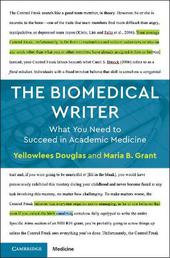
|
The Biomedical Writer: What You Need to Succeed in Academic Medicine
Paperback / softback
Main Details
| Title |
The Biomedical Writer: What You Need to Succeed in Academic Medicine
|
| Authors and Contributors |
By (author) Yellowlees Douglas
|
|
By (author) Maria B. Grant
|
| Physical Properties |
| Format:Paperback / softback | | Pages:214 | | Dimensions(mm): Height 186,Width 122 |
|
| Category/Genre | Life sciences - general issues |
|---|
| ISBN/Barcode |
9781108401395
|
| Classifications | Dewey:808.06661 |
|---|
| Audience | | Professional & Vocational | |
|---|
| Illustrations |
Worked examples or Exercises; 5 Halftones, black and white
|
|
Publishing Details |
| Publisher |
Cambridge University Press
|
| Imprint |
Cambridge University Press
|
| Publication Date |
5 April 2018 |
| Publication Country |
United Kingdom
|
Description
Co-authored by a leading ophthalmology researcher and a professor with fifteen years of experience teaching writing in the biomedical sciences, The Biomedical Writer addresses ways to use psychology and neuroscience to equip researchers and clinicians with an understanding of how effects like priming, primacy, recency, framing, and apparent paradoxes can make or break your articles and grant proposals. The Biomedical Writer covers everything from making sentences readable, effective, and memorable to working with collaborators under unforgiving deadlines. Going far beyond the basic structure and content of manuscripts and proposals, this guide to writing in biomedicine also focuses on topics that include handling negative results and the most important and neglected step in submitting manuscripts to journals.
Author Biography
Yellowlees Douglas is Associate Professor of Management Communication at the University of Florida. Maria B. Grant M.D., holds the Eivor and Alston Callahan, M.D., Endowed Chair in Ophthalmology at the University of Alabama, Birmingham. She has had a career in academic medicine for the last thirty years and her research focuses on vascular repair mechanisms in the eye and how these protective mechanisms are altered in diabetes. Dr Grant's lab also examines ocular angiogenesis and potential therapeutic applications for treating retinal and neovascular eye diseases. Her laboratory has been funded by the National Eye Institute since 1986. While she has conducted primarily basic research, she has also been the primary investigator in clinical research studies. She has authored more than 200 peer-reviewed publications and holds 12 patents.
|